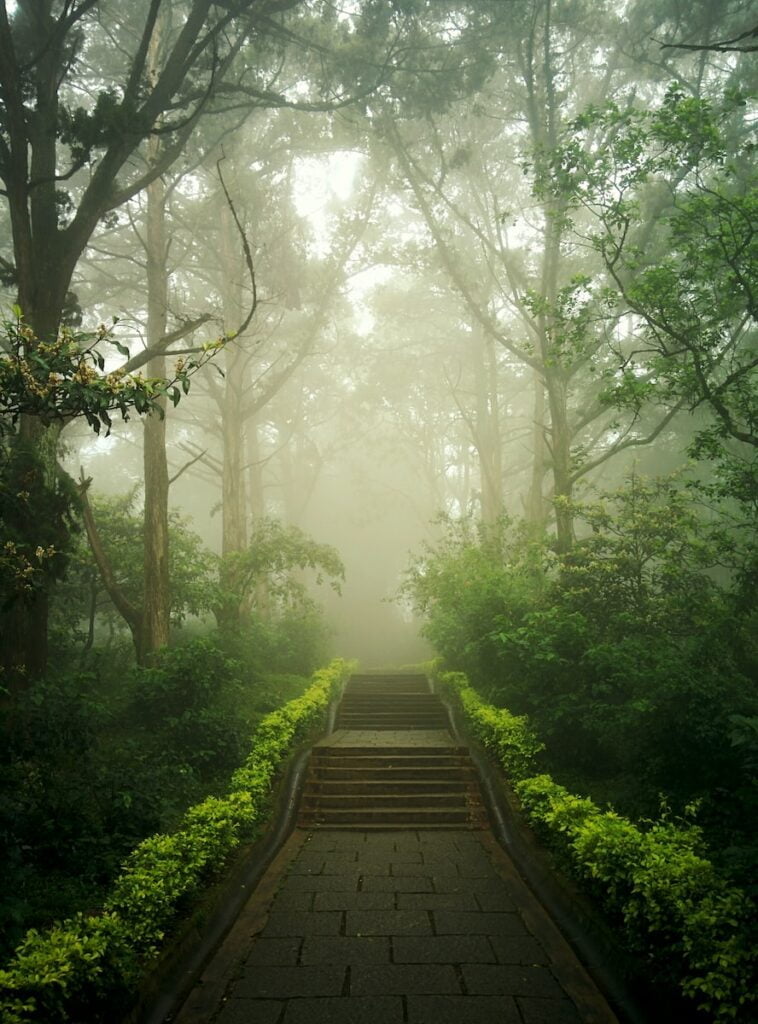Enrich Your Life: Living With Intentions And Without Regrets
Live a life without regrets by living intentionally. Enrich your life with purpose and fulfillment. Learn how to do it here on Rich Woman Magazine

Have you ever looked back thinking you wished you had done things differently? Living a life without regret and with intention is something many people strive for, but it can be challenging to know where to start. Many of us often look back on our past experiences and feel like we were driving through thick fog without a clear sense of purpose. However, by taking intentional steps towards living a more meaningful life, we can reduce the chances of experiencing regret and increase the likelihood of finding greater satisfaction in our daily lives.
In this article, we will explore some practical tips for living without regret and with more intention every day. From identifying your values and setting goals to practicing mindfulness and learning from the past, we will cover a range of strategies for living a life full of purpose and meaning. Whether you’re looking to make small changes or take a more significant leap, this article will provide guidance and inspiration for anyone seeking to live a more intentional and fulfilling life. So, let’s dive in and explore how to live without regret and with more intention every day.

Table of Contents
How do you release regrets in life?
As I sat alone in my hospital room after the surgery, I couldn’t help but think about all the things I regretted not doing in my life and all the people I wasn’t able to spent time with. I wished I had pursued my passion for writing instead of settling for a safe corporate job. I wished I had told my friend how much they meant to me before they died. I felt stuck and overwhelmed by the weight of my regrets. But as I sat there, I realized that dwelling on past regrets was preventing me from fully experiencing the present moment. I knew I needed to take action to release my regrets and live a more intentional life.
The first step for me was to start practicing self-compassion. I reminded myself that everyone makes mistakes and that it was okay to forgive myself. I focused on speaking to myself with kindness and understanding, instead of the harsh self-criticism that had become my default.
Next, I reflected on what I could learn from the past and I realised that everything that happened to me happened for me. I realized that my regrets held valuable lessons that I could use to make more intentional choices in the future. Suddenly, it was so clear to me that the real wins in life are the life lessons, those tests we pass in everyday life, overcoming challenges, turning them into opportunities, not the achievements or degrees we win.
I learned that pursuing my passion was more important than staying in a safe, but unfulfilling job. I also knew that I needed to focus on the present moment. Instead of getting caught up in my regrets, I started to attract opportunities, to create more satisfaction in life. Since I started a writing masterclass and people from around the world reached out to me to learn how to share their own story, I felt in total alignment with my life purpose.
Taking action was the key to releasing my regrets. Pursuing my passion and connecting with total strangers, including myself, opened the doors to my own heart. And these doors never close again.

Living intentionally in everyday life
Your time is limited, so don’t waste it living someone else’s life. Don’t be trapped by dogma – which is living with the results of other people’s thinking. Don’t let the noise of others’ opinions drown out your own inner voice. And most important, have the courage to follow your heart and intuition.
Steve Jobs
Releasing regrets can be a challenging process, but it’s an important step towards living intentionally in everyday life.
Living intentionally in everyday life means making conscious choices about how you want to spend your time and energy. It means being mindful of your values and priorities, and aligning your actions with those values and priorities.
Reflecting on the decisions you made in your private life or business, there is always the chance to make better choices as you learn from every experience along the way. Maybe you wished you had more fun and took less commitments, maybe you wish you made that investment abroad, or simply listening to your heart. Identify what’s most important to you and what you want to achieve in different areas of your life, such as relationships, career, health, or personal growth. Then, set specific, measurable goals that will help you move towards those objectives.
Another way to live intentionally is to practice self-reflection. Take time regularly to reflect on your thoughts, emotions, and behaviors. Notice what’s working well and what could be improved, and identify any patterns or habits that may be holding you back. Use this self-awareness to make intentional choices about how you want to show up in the world.
Living intentionally also means being intentional with your time and energy. Identify what activities and relationships bring you joy and fulfillment, and prioritize those things in your life. Learn to say no to things that don’t align with your values or priorities, and create space in your life for the things that matter most.
Finally, living intentionally means being open to learning and growth. Be willing to try new things, take risks, and step outside of your comfort zone. Embrace challenges and setbacks as opportunities for learning and growth, and use that knowledge to make more intentional choices in the future.
Making conscious choices that align with your values and priorities, setting clear goals, practicing self-reflection, prioritizing your time and energy, and making better life choices, you can create a more fulfilling life and avoid the regrets that come from living on autopilot.
Letting go of regrets and embracing self-compassion
We are born with compassion but practicing self-compassion can be difficult for many people, especially if they’re used to being hard on themselves. However, it’s an important step towards releasing regrets and living a more intentional life. One way to practice self-compassion is to speak to yourself as you would a friend. Imagine that a friend came to you with the same regretful thoughts you’re having.
What would you say to them? Chances are, you’d offer words of comfort and understanding, reminding them that everyone makes mistakes. Now, imagine saying those same words to yourself. It can be challenging at first, but with practice, it becomes easier to treat yourself with the same kindness and understanding that you would offer a friend.
Another way to practice self-compassion is to acknowledge your emotions without judgment. Instead of trying to push away regretful thoughts or feelings, allow yourself to feel them. Remind yourself that it’s okay to feel regret, and that it’s a normal part of the human experience.
Reflect on your past experiences and re-frame your perspective on mistakes. Instead of seeing them as failures, view them as opportunities for growth and learning. Every mistake or regretful decision has the potential to teach us something valuable, whether it’s about ourselves, our relationships, or the world around us.
Have you listened to the way you talk to yourself? Changing your negative self-talk, the narrative you tell yourself about yourself when no one is listening is the key to practicing self-compassion. Releasing regrets and living a more intentional life is about re-imagining the relationship you have with yourself, changing your self-perception, the way you see in the world. Speaking to yourself with kindness and understanding, acknowledging your emotions without judgment, will support you in your journey towards a brighter future.

Learning from the past
Learning from the past is a crucial step towards living without regrets and living with more intention every day. It’s important to reflect on past experiences and consider what you could have done differently, without getting stuck in regret or self-blame.
One way to reflect on the past is to identify patterns in your behavior or decision-making. Are there certain situations or types of decisions that tend to lead to regrets? Are there any underlying beliefs or values that may be influencing your choices? By understanding these patterns, you can make more intentional choices in the future that align with your values and goals.
It’s also important to consider what you learned from past experiences. What worked well? What didn’t work? What would you do differently next time? This type of reflection can help you make more informed decisions in the future and avoid repeating past mistakes.
Additionally, consider seeking feedback from others. Ask trusted friends, family members, or mentors for their perspective on past experiences. What did they observe? Are there any blind spots that you may not have considered? This type of feedback can provide valuable insight into your behavior and decision-making, helping you to make more intentional choices in the future.
Finally, be gentle with yourself as you reflect on the past. Remember that everyone makes mistakes and experiences regrets. The important thing is to use that knowledge to make more intentional choices in the future. Release regrets and break free from what is holding you back.
Focus on the present
Dwelling on the past can be a major obstacle to living without regrets and living with more intention every day. When we constantly replay past events or decisions in our minds, it can prevent us from fully experiencing the present moment. Instead of dwelling on the past, it’s important to focus on what you can do now to create a more fulfilling life.
One way to shift your focus to the present is to practice mindfulness. Mindfulness involves paying attention to the present moment without judgment or distraction. By practicing mindfulness, you can become more aware of your thoughts and feelings, and learn to let go of regrets or worries about the past.
Another way to focus on the present is to set goals for the future. Instead of dwelling on past mistakes or missed opportunities, focus on what you can do now to create a brighter future for yourself. Set achievable goals that align with your values and interests, and take concrete steps towards achieving them.
It’s also important to cultivate gratitude for the present moment. Even if your life isn’t exactly where you want it to be, there are likely many things to be grateful for in your current situation. Take time each day to reflect on the things you’re thankful for, whether it’s the people in your life, your health, or simple pleasures like a beautiful sunset or a good meal.
Finally, consider seeking support from others. Regrets can be isolating, and it’s important to have a supportive network of friends, family members, or professionals who can help you navigate difficult emotions and make positive changes in your life.
In summary, dwelling on the past can prevent you from fully experiencing the present moment and living a fulfilling life. By practicing mindfulness, setting goals, cultivating gratitude, and seeking support from others, you can release regrets and create a brighter future for yourself.
Taking action
If you have regrets about something you didn’t do in the past, taking action now can be a powerful way to move past those regrets and create new opportunities for growth. Whether it’s pursuing a new hobby, learning a new skill, or reconnecting with a friend or family member, taking action can help you create positive change in your life.
One way to take action is to set achievable goals for yourself. Identify a specific action that you can take to move towards your goal, and then break that action down into smaller steps. By taking small, concrete steps towards your goal, you can build momentum and create positive change in your life.
Another way to take action is to challenge yourself to step outside of your comfort zone. Often, regrets stem from missed opportunities or choices that were safe but ultimately unfulfilling. By taking risks and trying new things, you can expand your horizons and create new opportunities for growth and fulfillment.
It’s also important to surround yourself with supportive people who encourage you to take action towards your goals. Seek out friends, family members, or mentors who can offer guidance, support, and accountability as you work towards your goals.
Finally, be patient with yourself as you take action towards your goals. Change takes time, and it’s important to celebrate small victories along the way. Remember that every step you take towards your goals is a step towards a brighter future, free from regret and full of intention.
In summary, taking action is a powerful way to move past regrets and create positive change in your life. By setting achievable goals, stepping outside of your comfort zone, surrounding yourself with supportive people, and being patient with yourself, you can create a more fulfilling life and live with more intention every day.
Living in the now
Mindfulness is an important practice of letting go of regrets and living with more intention every day. Living in the now helps you stay present and aware of your thoughts and emotions. When you focus on the present moment, you can observe your regrets from a distance, without getting caught up in them, allowing you to let go and move forward.
Start by taking a few deep breaths and focusing on the sensations in your body. Notice any thoughts or emotions that arise, without judging or reacting to them. Instead, simply observe them and let them pass, like clouds in the sky.
Pay attention to your senses and fully immerse yourself in the experience, without worrying about the past or future. Engage fully in what you’re doing, whether it’s driving, cooking, washing dishes, taking a walk, or having a conversation with a friend. You can develop a greater sense of awareness and presence in your life and let go of regrets. Focus on the present moment, where you have the power to make intentional choices and create a more satisfaction in your life.
In conclusion, living in the now is essential for avoiding regrets and living with more intention every day. By practicing mindfulness and focusing on the present moment, you can let go of regrets and create a more fulfilling life. So take a deep breath, engage fully in the present moment, and enjoy the journey.

Building meaningful relationships
Prioritizing relationships is a crucial aspect of living with intention and without regrets. Our relationships with family, friends, and loved ones provide us with a sense of belonging, love, and support and sometimes we need to remember that less is more. It is fair to say that setting boundaries is as important as building relationships.
Building a better relationship with yourself is another important aspect of living with intention and without regrets. It’s easy to get caught up in the daily grind and neglect our own needs and well-being. However, cultivating a healthy and positive relationship with yourself is crucial for overall happiness and fulfillment in life.
Start by practicing self-care on a regular basis. This can include things like getting enough sleep, exercising regularly, eating a healthy diet, and engaging in activities that bring you joy and fulfillment. Prioritizing self-care helps you to show up fully in your own life and in your relationships with others.
It’s also important to practice self-compassion and self-forgiveness. Everyone makes mistakes and experiences setbacks, but beating yourself up over them only leads to feelings of regret and self-doubt. Instead, practice speaking to yourself with kindness and understanding, and forgive yourself for past mistakes.
Finally, make time for self-reflection and personal growth. Reflect on your values, goals, and passions, and take action to align your life with what truly matters to you. This can include things like setting boundaries, saying no to things that don’t align with your values, and pursuing new experiences and opportunities that bring you closer to your goals.
Building a better relationship with yourself requires constant awareness, as you through the circles of life and you are changing all the time. Knowing yourself is the most complex knowledge you could ever experience but leads to self-mastery.
Research shows that people who prioritize relationships and spend quality time with loved ones are happier and healthier than those who do not. Cultivating meaningful relationships takes time and effort, but the benefits are worth it.
Make an effort to spend quality time with the people you care about. This can be as simple as scheduling a weekly phone call with a friend or planning a regular date night with your partner. Taking the time to connect with loved ones on a deeper level can help strengthen your relationships and provide a sense of fulfillment and purpose in your life.
New relationships will expand your social circle. Joining clubs or groups that align with your interests or volunteering for a cause you care about can help you meet new people and form new connections.
Prioritizing relationships also means setting boundaries and making time for self-care. It’s important to take care of your own needs and well-being in order to show up fully in your relationships.




